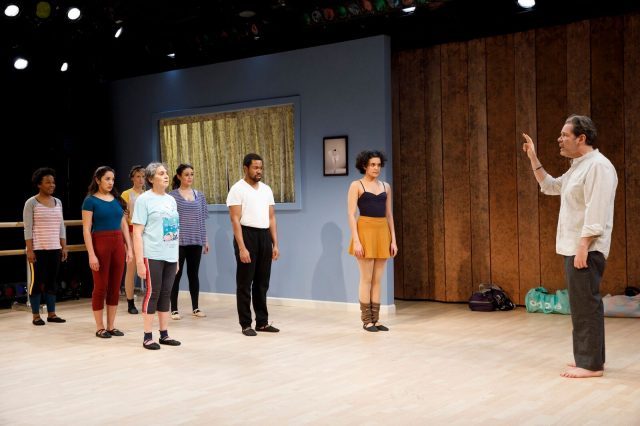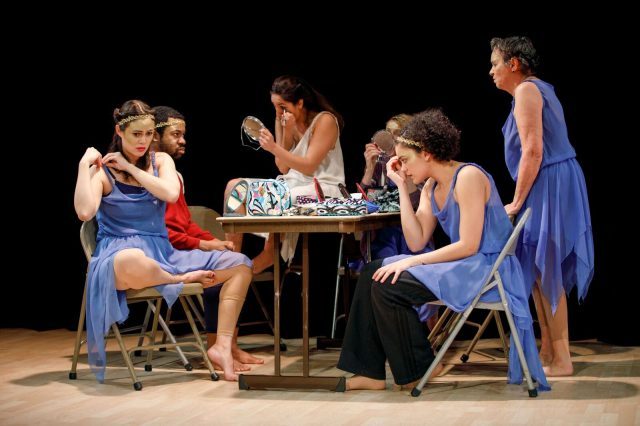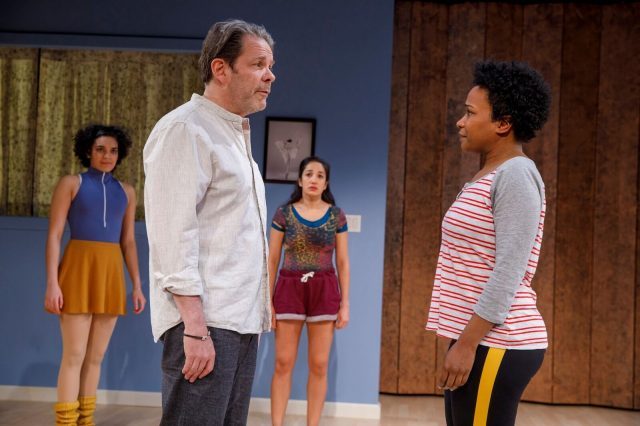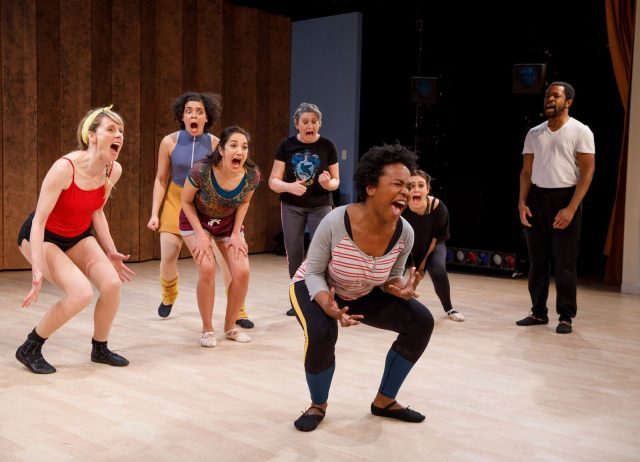
Dance Teacher Pat (Thomas Jay Ryan) leads the team through rehearsal in Dance Nation (photo by Joan Marcus)
Playwrights Horizons
Peter Jay Sharp Theater
416 West 42nd St. between Ninth & Tenth Aves.
Tuesday – Sunday through July 1, $59-$99
www.playwrightshorizons.org
Clare Barron’s Dance Nation is a brilliant, savvy comedy that moves and grooves to a magnetic beat that melds the present and the future in ingenious ways. The swiftly paced 105-minute play, which opened tonight at Playwrights Horizons, follows a Liverpool, Ohio, preteen dance team on the road to a potential championship in Tampa Bay. But the six girls and one boy, who are between eleven and fourteen, are played by grown-ups who range in age from their twenties to their sixties, imbuing the characters with the knowledge they have gained through experience. Barron considers it a “ghost play,” where the children haunt their adult selves and vice versa, as if the kids know what they will become. Through sharp, honest dialogue, tremendous humor, and more than a bit of anger and rage, Barron and Obie-winning director-choreographer Lee Sunday Evans employ stereotypes in order to reclaim and redefine them for the #MeToo generation. The team consists of star dancer Amina (Dina Shihabi), confidence-challenged Zuzu (Eboni Booth), practical Connie (Purva Bedi), not-as-talented Maeve (Obie winner Ellen Maddow), wise-beyond-her-years Sofia (Camila Canó-Flaviá), advanced, anarchic Ashlee (Lucy Taylor), and gentle, soft-spoken Luke (Ikechukwu Ufomadu), representing multiple races, ethnicities, classes, and body shapes. The tension between the intense bonds of an adolescent group and individual ambition is beautifully explored.

The girls and Luke (Ikechukwu Ufomadu) prepare for their new piece in award-winning play by Clare Barron (photo by Joan Marcus)
The team is entering a group competition, but each dancer has his or her own dreams and goals; some want to stand out more than others, so when Vanessa (Christina Rouner) gets hurt at the end of a performance, blood oozing around a broken bone in her leg, her teammates run away or avoid her, knowing that such a fate could befall any of them. But their fearless leader, Dance Teacher Pat (Thomas Jay Ryan), readies them for the next competition, for which he has choreographed a dance drily hilarious in its topic and treatment: “an acro-lyrical” piece about a heroic male activist who brought about change in his country and around the world. The girls and Luke discuss who should play the lead, talk about masturbation, deal with their mothers, and celebrate the many strengths their discipline affords them. In unison they chant, “If I could dance and nobody would ever want to kill another person again / Or be racist again / Or feel alone at night again / Or abandon their pets without a home again / That’s what I would do / That’s what I would do / That’s what I want to do with my life.”

Dance Teacher Pat (Thomas Jay Ryan) talks strategy with Zuzu (Eboni Booth) as competition nears (photo by Joan Marcus)
In one of the play’s most amazing moments, the brash and bold Ashlee delivers a scathing monologue that essentially screams in the face of the gender gap, recognizing the terrifying power of sex, desire, beauty, and youth along with her own ambition. Focusing on her face and body but with deeper meaning, she describes her “epic bottom” and how men like to stroke it, brags about her penchant for math, and wonders how to handle it all. “I’m a little afraid of what would happen if I really went for it,” she says. “Like if I tried. If I really, really tried. Like if I acknowledged it. Just embraced it. Like if I walked down the street and looked those men straight in the eyes and said: ‘Yes, I’m beautiful and I’m gonna get a perfect score on the SAT, Math, Reading and Writing, motherfucker, and yes I’m only thirteen years old now but just wait ten more years. . . . I am your god. I am your second coming. I am your mother and I’m smarter than you and more attractive than you and better than you at everything that you love and you’re going to get down on your knees and worship my mind, my mind and my body and I’m gonna be the motherfucking KING of your motherfucking world.’” Barron makes it clear that this is a woman-dominated world; Rouner plays several of the dancers’ mothers, with fathers nary mentioned. Even the town’s incoming priest is a woman.

The dance team is ready for action in Dance Nation at Playwrights Horizons (photo by Joan Marcus)
Dance Nation has much in common with The Wolves, Sarah DeLappe’s dazzling play about a girls soccer team. In fact, the two works shared the inaugural Relentless Award, given in honor of Philip Seymour Hoffman to plays that “are challenging,” “exhibit fearlessness,” “are not mainstream,” “exude passion,” and “are relentlessly truthful.” Dance Nation, which also won the Susan Smith Blackburn Prize, awarded to an outstanding English-language work by a woman, is all that and more. The Washington-born Barron was inspired to write Dance Nation after seeing the “horrific” reality show Dance Moms and also being insulted by a male theater journalist because she is a woman, regretting that she let him get away with his demeaning treatment of her. She calls out everything she can in this thrilling production, deftly addressing hot-button issues in both daring and subtle ways. In one critical locker-room scene, most of the girls change in full view of the audience, revealing their very different bodies without pride or shame. Ryan (The Amateurs, Travels with My Aunt) has a blast as the team’s conductor, ably guiding them across Arnulfo Maldonado’s set, primarily a rehearsal studio that morphs into a grassy hill and other scenes. The six women and one man playing the dancers are all outstanding, forming a terrific team; Barron (You Got Older, I’ll Never Love Again) and Obie winner Evans (Home, [Porto]) give each their moment to shine, but it is as an ensemble that this corps glows brightest.